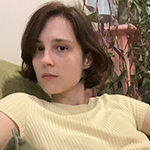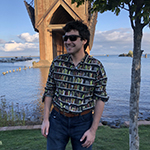Mother Is Dead
My mother stopped screaming at my sister, who was, by now, thirty feet out in the water, and jumped into the ocean after her. I was twelve; she was seven. How she got so far out, I have no idea. Maybe because we never went to the beach, my sister barely knew how to swim. We only took the trip on that occasion because my mother was trying to cheer us up after our father’s death. It was my fault: I was the one who’d asked to go to the beach. But the heat that day was oppressive, and everything had gone wrong from the start: my mom forgot to pack an umbrella, and my sister got sand in the peanut butter jar, so we sat in the midday sun and ate jam on untoasted bread. To escape the heat, my sister had jumped in the water, without any regard for the tide. I stood and watched as my mother carried her back to shore. When they made it to me, I grabbed my sister’s hand as my mother ran to get a towel. We went home from the beach early that day, and my sister took a hot bath, and I sat in my room alone, staring at the ceiling. My sister was always getting into trouble, and my mother coddled her. That day, she could have died trying to save her. She was the little one. She couldn’t take care of herself. I tried so hard to be good, and what did I get for it?
*
Julia and I lie on our mom’s sectional in black dresses. I have one leg off the couch and the other propped up on a pillow. I am just beginning to feel the effects of the day’s heat: slowed movement, a stillness in my mind. Anything that catches my attention becomes a rabbit hole to wander down. I glance at my sister, who stares absently at the ceiling, biting her nails. In my mourning clothes, the memory of our father’s funeral looms closer. It took six months for leukemia to take him. We weren’t prepared for his death. Mom lived much longer. Until last week, that is, when she fell down the stairs. We weren’t prepared for that one, either.
“Do you remember when we were at the beach after Dad died?” I ask my sister.
“I remember,” she says.
“And you almost drowned when Mom went to get ice cream?” I ask.
“That’s not what happened,” she says, drawing out the vowels. “Mom went to get us popsicles. And I wasn’t drowning. She was just upset that I went in the water when she wasn’t looking. She always overreacted.”
“I remember you coughing up water when you got out. Mom put you in swim lessons after.”
“She put you in swim when you were seven, too. Look, I don’t want to argue about it. I didn’t drown, and Mom wasn’t getting ice cream.”
“How do you remember it, then?”
She takes a moment to consider.
“We barely spoke that day. Mom read and we built a sandcastle. No one had anything to say to each other. It was terribly hot and everyone was depressed.”
“See,” I say, smiling. “And that’s why you went in the water. You couldn’t stand it anymore. Dad’s death weighed on you.”
“It weighed on you, too. You took almost a month off school. You fainted at the hospital and had a string of fevers. Mom made chicken stock for weeks, even though it was an unusually hot September. We’d all sit in the kitchen eating soup, waiting for your fever to break. You were the one who needed caring for.”
“That’s not true. It was because of my period that Mom made the soup. I had bad cramps.”
She absently opens and closes the blinds next to her, pulling on the string. “That’s just not right,” she mutters. Then, more loudly, “Do you really not remember why I went in the water?”
I roll my eyes.
“No, really,” she continues. “Do you not remember what you said about dead people in the water?”
My sister’s memory of the past is usually entirely different from my own recollection, but she supports her claims with tiny details no one else could verify. Her memory gave her stories credence and lent her an air of authority that was hard to refute. It was also why everyone, ever since we were kids, liked her so much: she made them feel special by recalling their birthday after meeting them once, or the name of their pet, or exactly what they said to her on the beach twenty-five years ago. When Mom and Aunt Louisa argued about which Christmas dinner Uncle Eric had shown up drunk and crashed the car into Grandpa’s living room, she spoke up, pointing out that it had to have been when she was nine. If it had been any later than that, Eric would have hit Sam’s RV, which was parked out front after he moved in to take care of Grandpa. If it had been any earlier, Grandpa wouldn’t have stood outside screaming about how he’d just had the shingles redone after thirty years. Not only did she remember this: she also cited the temperature outside when we opened the front door. She knew that Mom had been wearing her red velvet shirt, and that Grandpa’s breath made a large cloud in front of him as he screamed at Eric, who just stood there and took it, holding a palm to his bloody forehead.
And they looked at her and smiled, like what she said settled the matter. Like just because she knew these details, she had access to some secret knowledge they didn’t. She always needs to be the favorite, the helpful child, the forgiving daughter. She’s terrified of making people upset. She’s so easygoing, but she’s never been able to hold down a job: she works part-time because she got fired from the only full-time job she ever had, and decided she’d never give so much to one employer again. She’d called me crying for months, each time her bosses were upset, unable to stand up for herself at her job. I gave advice she never took, and knew it was a matter of time before they let her go. She never asserts herself, even when she wants to, because she’s so afraid of confrontation, and can’t stand the thought that another person might not like her.
Our mom was not like that. Our mom was loud and brash and struggled to keep abreast of everything that life threw at her. And I’m like Mom. That’s why no one likes me.
“Whatever,” she says, shaking her head. “Let’s just grab some photos and get out of here.”
We’re supposed to be going through photos. That’s why we came. Right.
*
We get off the couch and walk down the hall. I open the door to my mother’s bedroom. The blinds are down and it is musty and I walk to her closet and open the door. It’s stuffed with boxes. Mom was organized enough, but she had too much shit to take care of. She often called the house an overflowing ship, as though, living in this apartment, we were lost at sea. I grab the stepstool under her bed and stand on it to push aside boxes stuffed on the uppermost shelf.
I pull down a box filled with unsorted Kodak photos of the family, mostly from the vacations we took as children. I pass it to Julia. Sitting on the ground, I shuffle through a handful and find photos of old trips to Sequoia, Zion, Arcadia. There are some of our parents standing outside the apartment when they first moved west, and others of me and my sister playing in the park down the street. There are several of me climbing trees, scrambling over rocks, or standing with my arms out in front of vast desert landscapes. Two in particular stand out: one in which I climb a tree wearing a dress covered in sunflowers, my mother below me and facing the camera, her mouth open wide as she yells at me to come down—as she so often did if I climbed anything taller than her hips. In the other, I stand with my mother in front of the Grand Canyon, her hand on my shoulder, both of us looking off to our left, laughing, as though something just outside of the frame has stolen our attention right as the photo was taken.
I bring this photo close to my face, so that my breath fogs it up, and I have to pull it back again. In this photo, we look exactly the same, my mother and me. We have the same button nose: wide at the tip with an upwards curve. The small dimple on our chins stands out in the light, my hair cut exactly like hers, just above the shoulders. I put the photo aside and find dozens more that capture our similarities. Back then, I hadn’t recognized that I was her spitting image. Over time, I have come to accept it, reluctantly, angrily. But I’d never been confronted with such an onslaught of evidence of our physical parallels: the dimpled chin, the unruly hair, wide shoulders, small hips. I even have her unnervingly large and flat upper lip. I panic. Perhaps it means that our brains, too, are shaped in a similar way, and if you cut us open, you would see that we are the same person, inhabiting the same mind.
I have the impression that I can erase our similarities if I dispose of these photos, which serve as evidence that I am descended from this woman who, in many of the years these photos were taken, was mad. She was incapable of raising two daughters alone, barely keeping herself and her home together after her husband’s death.
Like, for instance, after my mother had gotten me used to walking home from the bus stop for years, forever forgetting to pick me up, she showed up at school one day to grab me because she’d had a doctor’s appointment nearby. She wandered the halls asking teachers and students where I was, so by the time I got out of class everyone had already seen her: hair matted from not having showered in days, a rotting odor of eggs on her breath, her lips pale and cracked. She wore these ill-fitting, capri-length, too-tight yoga pants, and her calves weren’t shaved. She even had on the Pacsun hoodie a boy I no longer spoke to had given me the year before, when I’d needed to walk home late from his house. I had put it in the Goodwill pile in our garage, and my mom had apparently plucked it out without saying anything. I couldn’t process this image: her standing in my school’s halls, her insanity on display for anyone to see. In the car home, I screamed at her for embarrassing me in front of my friends. I told her she was an idiot. I believe I told her, in my outsized feelings, that I hoped she would die, too. Of course, I didn’t consider what I was saying. But I said it and then she called me a bitch, and for the rest of the car ride we were silent.
I’m not mad. Or, I can’t be, because I don’t have the time or the resources. And if I never gave my sister the chance to display these photographs at the funeral, no one would know how mad I might possibly be. No one would be able to look at these photos, as I am now, and think: I never realized quite how much Lily looks like her mother, which explains why she inherited her tumultuous, impetuous, cold, demanding disposition.
I put the photo down. My sister is looking at her own pile.
“Fine. What did I say about the water?” I ask.
“That the entrance to the underworld was in it, and if I went and got Dad, he’d come back.”
I don’t remember this.
“So you thought you could bring him back?”
“Yes.”
“And what was your plan?”
“To find him and help you feel better.”
“Why did you think he was there?”
“There was a man out in the water, swimming. He looked like Dad.”
“Did you tell Mom?”
“No. When we came back, you were crying.”
“I never cry.”
“Well, that’s why we went home.”
*
I ignore her version of events. I’m too tired to argue, and besides, I’d never win.
“I look exactly like Mom in these photos,” I say, holding them up. “Why do I have to look exactly like her in every photo?”
If my sister had brought these photos out for the funeral, I would have been mortified. I may have even killed her, right there at the funeral, for exposing me like that. I would have rushed at her over the coffin and strangled her above Mom’s dead body. It would be a closed casket, of course. We remember our grandmother’s death: how the coroner had botched her makeup, so when we looked at her face we knew she wasn’t there anymore—her cheeks too pink, her lips too red. The color was all wrong. Seeing her face shook my dad so thoroughly that, on our way home, he’d told us we were all going to have closed caskets, or get cremated. And my sister said she liked the idea of an open casket because then the dead person could watch over us at the funeral, and my dad said that wasn’t how it worked, and my mom said how would you know, and the two of them continued bickering so that when I asked what cremated meant no one heard me.
“You’re nothing like Mom,” my sister says. “That’s what you’re afraid of, isn’t it? But you’re not soft enough. And you’re so obsessed with differentiating yourself, you never saw what was good about her. She took care of us. She looked out for us. That counted for nothing to you, though. You took her for granted. Am I right?”
This was something else Mom had liked to say: family isn’t something you can take for granted. It’s a relationship you work on, and those relationships can be ruined, too. It’s why she stopped talking to her sister. She’d told me she’d rather die alone than have a conversation with her. She didn’t worry much about unfinished business or dying. It was Dad who’d been afraid of death, since the men in his family all died young. Mom’s family lived forever, or died of a horrible accident: mountaineering, a car crash. She was convinced for many years that if she could just make it to seventy, she’d be ok. But she didn’t make it. In the end, both of them were right, no matter how much we’d told them they were crazy, or melodramatic.
Julia picks up the pile I’d put to the side.
“We’re not bringing those,” I tell her, taking them out of her hand.
*
I stand up and start pacing the room.
“You were always the favorite,” I tell her, ripping the photos in half. “You’re right, okay? I’m afraid of growing old and being just like Mom: struggling to keep my life afloat, a distracted control freak, alone forever, my whole body aching by the time I’m forty, where simple colds wipe me out for days. I am afraid of looking out only for myself, of stepping in only at the last minute: when it’s too late, when my daughter’s already drowning—because you were drowning. You say I’m nothing like her, but it’s certainly not you who has her disease—you even followed dad’s career. And you look like him.” I rip the photos again and pace the room. “You have his skin, his blood. Don’t you get that? After you married so young, she treated me like a spinster. She’d suggest I ask out some guy on the street, or set me up with her friend’s son, and then act like I was unhappy and my being single was the root of all my problems. I never wanted this. But she picked on me. She never worried about me, or how I was doing. Only if I was dating. She spoke about my life with a tone like I had done something wrong. Like it was my fault. Like my career counted for nothing. God, if we ever had dinner together, Mom found a way to turn the conversation to how I’d never find a husband. I just wanted to spend time with her. You don’t know what it was like.”
I grab fistfuls of the loose photos scattered across the floor and stuff them back in the box. Still holding the scraps I’d ripped—the ones that had to go—I stumble into the kitchen. I need to keep everything in order so that no one will know about the photos, or how much they had unsettled me, pushing me into this abyss. I tear them into smaller pieces and toss them in the trash.
“Take it easy,” my sister says, standing behind me.
“How is it you remember everything different from me?” I ask.
I turn around, and for a moment, I have that image of me strangling her above the coffin, and think I could do it now. I take a step towards her. She looks out the window lazily.
“It’s so sunny,” she says. “I bet we have time to go to the beach.”
*
She asks me if I still think the underworld could be out there, past where the waves break.
“Mom might be there now, and if we could only save her, we could bring her back,” she says.
Then she runs in, without taking off her black dress, and I watch as she wades out in the water. When she starts swimming, I can’t take it anymore. I go in after her. The ocean is colder than I expect—it always is—but I push forward, wanting to stay with her, to see where she is leading me. Maybe, if I could keep up for once, Mom really would come back and tell me I had done a good job with my life. Even if she’d sometimes hated me, or hit me. My feet stop touching sand, and I begin treading water. A wave crashes over my head, and I hold my breath and duck under. I am sucked back to the surface, and another wave comes, and I am swept up by its force. I swim further out, my sister’s head poking in and out of view. Then I am past the wave break. My sister floats on her back, waiting for me, always one step ahead. I do the same as her. I look at the clouds in the sky.
I might have a tendency to overdo things. The one thing I never had done was “take it easy.” I struggled with moderation. Even that little girl in the photographs: she had no idea how to live in moderation. That was something we had in common. We only knew how to do things all or nothing. Like in the photo where I climbed the tree, and my mother stood below me. When I was young, I could climb all day, and I looked forward to those brief moments above the park, which I associated with freedom. I never slipped or fell or got stuck, even though my mom told me I would, and threatened to climb up to get me. But I knew she never would. I knew she couldn’t. The body has a way of becoming clumsy with age.
One of the few things that marked me as separate from my mother had been that fearlessness, that absolute control over my body, the willingness to keep going on my little adventures. As I grew older, my excess found an outlet elsewhere: in drinking, in speaking, in going long stints without a shower. I am bad at being quiet and docile and subdued in the world. Throughout all my reading in college, I came across passage after passage waxing poetic about the essential passivity of women. But in my real life, I never found this to be true. Not of the women I knew, especially not the woman who raised me. Even if she could get beaten up by the world around her, there was a resilience that I did not associate with apathy, and a fierce determination that I did not associate with a single sex. My mother—even in that photo of me, with her hands thrown up and her mouth open, yelling at me to come down—was always angry and yearning. She did not struggle with asserting herself in the world.
I right myself and look at my sister. I watch water droplets fall across her cheeks. For a moment, looking at her—just her face, disembodied—I see my dad again.
“I guess she isn’t here,” I tell her.
“No,” she says, righting herself, and the image of my sister is returned to me. “What did we expect?”
Brianna Di Monda edits for the Cleveland Review of Books. Her fiction has appeared in Prairie Schooner, Oyster River Pages, Taco Bell Quarterly, and Worms Magazine, among others. She’s a recipient of the Glenna Luschei Award for Fiction, a semifinalist in the American Short(er) Fiction Contest, and a nominee for the PEN/Robert J. Dau Short Story Prize.

 BACK TO ISSUE
BACK TO ISSUE




